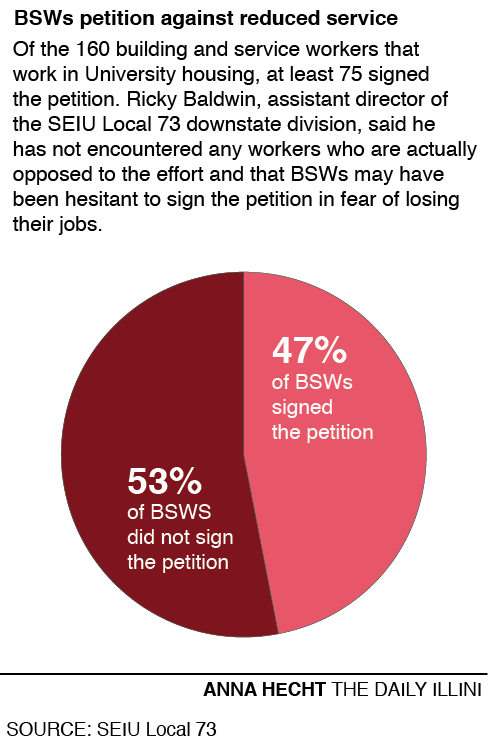Building Service Workers address quality drop
October 13, 2014
Building Service Workers no longer believe students are getting what they paid for in University Housing fees.
BSWs informed student residents with a letter circulated through housing buildings in September that residence halls have been less clean due to administrators prioritizing “other concerns”, cutting workers’ hours and refusing to fill jobs as BSWs retire or leave.
The letter was written in collaboration with the Service Employees International Union, Local 73, a labor union representing 28,000 workers in Illinois and northwest Indiana.
Ricky Baldwin, assistant director of the SEIU Local 73 downstate division, said he wrote the initial draft in consultation with the BSWs in response to complaints he began receiving from workers in May.
“In the summer of this year, management began combining a lot of jobs, so what might have been an 8-hour job for years is now being asked to be done in 4 hours,” Baldwin said.
Get The Daily Illini in your inbox!
In the letter, BSWs said they take great pride in their work and are concerned about its quality, the cleaning that is going undone due to the drastically shortened time frame and the potential for workers to injure themselves while rushing to
get the job done.
Baldwin emphasized the concerns are unique to this semester. However, he said relatively low-level complaints concerning the empty spaces left unfilled by BSWs began approximately five years ago. He said the largest number of BSWs retired as a result of changes in the pension law.
As a result, the BSWs became concerned last year when they realized that a large amount of work was going undone.
Diana Waller, a building service worker for 19 years, said she believes the students deserve more.
“What really upsets me is that they charge you all so much, but they’ve lowered the standards of cleaning, and they have so many open positions that they’re not filling,” Waller said. “If you paid for a clean dorm, then that’s what you should be getting.”
Waller said that almost all BSWs support the fight against reduced service because of how it dynamically affects both the workers and the students.
“They enjoy their work, because they enjoy providing a service for the students,” Baldwin said. “They get to know some of the students, and they feel bad if there are roaches, or trash is not taken out on a regular basis.”
Robin Kaler, campus spokeswoman, said in an email that University Housing continues to provide the same level of service for cleaning and maintenance throughout the school year.
“University Housing works to carefully steward the resources students and their families pay, so vacant positions always are evaluated before a decision is made on whether to fill them,” Kaler said.
Kirsten Ruby, associate director of University Housing, endorsed Kaler’s statement and declined to comment further on the issue.
Waller said BSWs are also concerned that their salaries have not changed as housing rates and tuition have risen.
“The University claims they don’t have the money and the budget, but they are constantly hiring upper management,” Waller said. “Tuition goes up every year, but it isn’t going into the service that students should be receiving for the money they are paying.”
In addition, Baldwin said the extra workload and the time restriction has been a main complaint of the BSWs to SEIU.
“You could time me cleaning the bathroom when the bathroom is not very dirty, and I could probably do it very quickly,” Baldwin said. “But if I walk into a bathroom that’s dirtier, it takes more time to clean that.”
Baldwin said some BSWs have also been skipping their breaks trying to get work done, which has become problematic since they become “physically worn out.”
Waller said one morning she went to work and saw her area had not been properly cleaned over the weekend by an employee because he was responsible for this extra work on top of his routine job.
Based on the letter, the BSWs have been fighting the administration’s “constant threat of outsourcing our work to overpriced private contractors who often do shoddy work.” Waller said this is another violation of the BSW contract with the University.
The letter also highlighted that the usual standards of cleanliness were lowered due to the administration prioritizing other concerns.
“I have heard that management has lowered the standards of cleaning in the dorms, but they won’t tell us what the new standards are,” Waller said.
Baldwin said management stated new building service jobs would be reduced to different standards.
“The BSWs were always trained to clean to a certain standard, which was basically ‘clean everything’,” Baldwin said. “But they are not familiar with the new standards, so they are told ‘just go in and get the big stuff’.”
Baldwin said that management claimed they would take those standards off the job, but they never did. As a result, the workers don’t know what they’re supposed to do. They are often told to ask their supervisors, who usually say to get it all done, Baldwin added.
The letter is still circulating at residence halls, according to Baldwin.
In addition to the letter, he said at least 75 of 160 BSWs signed a petition created with the help of the SEIU, which was submitted to University administration in August.
The petition addressed a stand against the combined jobs and additional workload, and asked administrators to meet with them to discuss the issue. However, Baldwin said the administrators never responded.
“I have union stewards who are BSWs that work in housing, and management has refused to meet with them, so there’s a big communication problem,” Baldwin said.
Faraz can be reached at [email protected].







